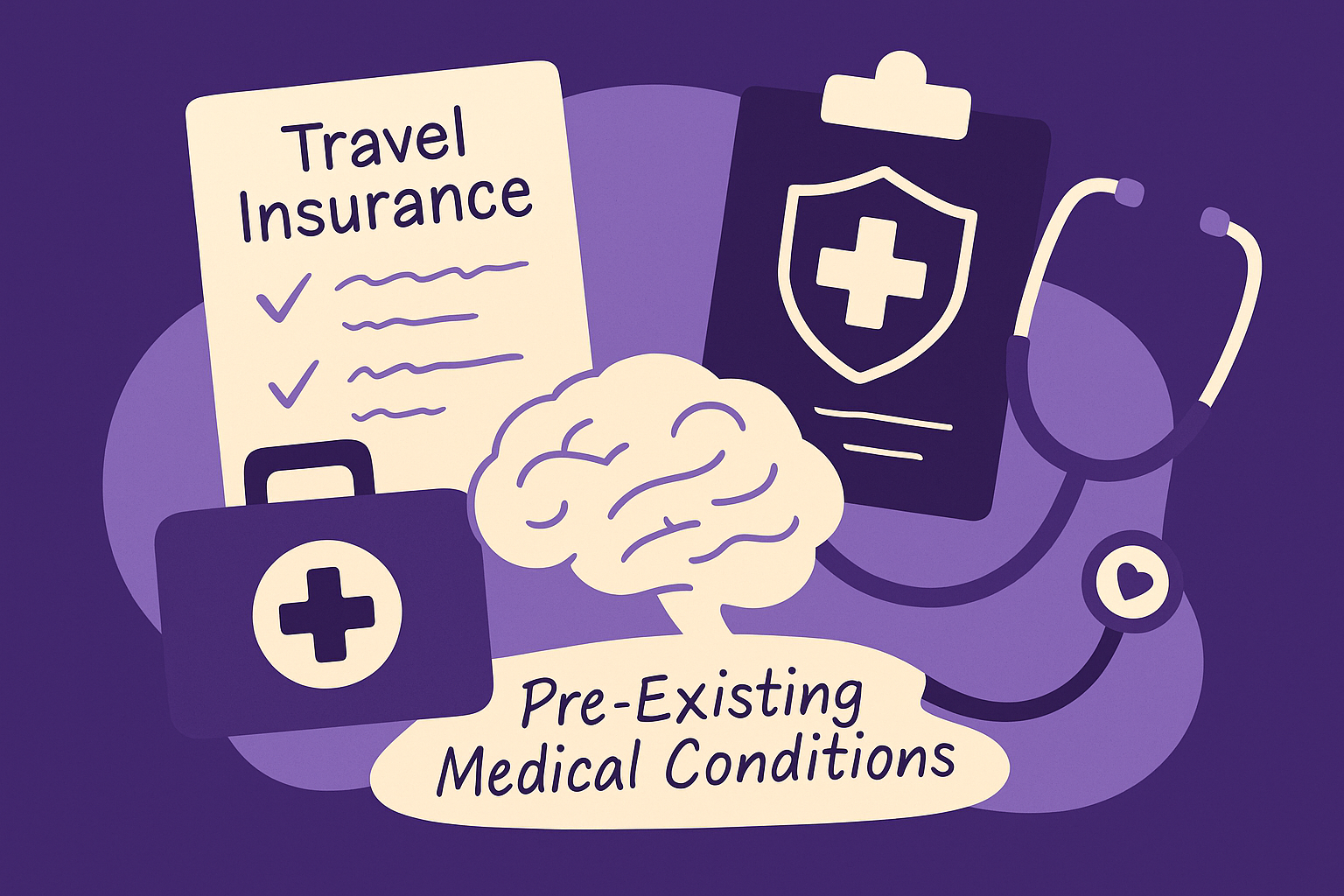Having a medical condition doesn’t mean you can’t travel or get insurance coverage. Many travelers with diabetes, heart disease, cancer, or other health conditions successfully obtain travel insurance that covers their pre-existing conditions. The key is understanding what counts as a pre-existing condition, which insurers specialize in this coverage, and what you need to disclose. This article explains how to get travel insurance when you have health conditions and what to expect during the process.
What Qualifies as a Pre-Existing Medical Condition
A pre-existing medical condition is any health issue you had before purchasing your travel insurance policy. This includes diagnosed conditions, ongoing treatments, prescribed medications, and symptoms you experienced even if you haven’t received an official diagnosis yet. Insurers typically look back 60 to 180 days before your policy purchase date to determine what counts as pre-existing.
Common pre-existing conditions include diabetes, heart disease, high blood pressure, asthma, COPD, cancer (past or current), arthritis, mental health conditions, and thyroid disorders. If you take daily medication for any condition, that condition is pre-existing. Recent surgeries, hospital stays, or changes to your treatment plan within the look-back period also qualify.
The distinction between stable and unstable conditions matters significantly. A stable condition means you haven’t had treatment changes, medication adjustments, new symptoms, or medical consultations for that condition within a specified period usually 60 to 90 days. Unstable conditions involve recent changes and are harder to insure. Even well-controlled conditions like managed diabetes or regulated blood pressure count as pre-existing and must be disclosed.
Travel Insurance Companies That Cover Medical Conditions
Yes, there are several travel insurance companies that cover pre-existing medical conditions, though options vary by provider and location.
For US Travelers
Major US insurers like Allianz, Travel Guard (AIG), Nationwide, and Seven Corners offer pre-existing condition coverage through their waiver programs when you purchase policies within specific timeframes after booking your trip. Travel Guard requires purchase within 15 days, Allianz within 14 days, and Seven Corners within 20 days of your initial trip deposit.
Specialized US insurers focus specifically on travelers with complex medical conditions. Travel Insured International, IMG, and Generali Global Assistance work with travelers who might struggle to get coverage elsewhere, including those with cancer, recent heart attacks, or multiple chronic conditions.
When comparing US options, use platforms like InsureMyTrip and Squaremouth that let you filter specifically for pre-existing condition coverage. InsureMyTrip features over 20 travel insurance providers and includes a pre-existing conditions filter in their comparison tool. Squaremouth offers similar functionality and maintains quality standards by removing providers that fall below 4-star customer ratings.
For UK Travelers
AllClear is a leading UK specialist that provides coverage for complex and multiple medical conditions through detailed medical screening. They work with travelers who might struggle to get coverage elsewhere and cover over 1,300 medical conditions with no upper age limits.
Compare the Market specializes in medical condition coverage for UK travelers and walks you through a medical screening questionnaire to find suitable providers. They work with multiple insurers who compete for your business based on your specific health profile. The screening process might seem lengthy, but it ensures you get accurate quotes for coverage that actually protects you.
Pre-Existing Condition Waivers Explained
A pre-existing condition waiver is the most common way to get coverage for your existing health conditions through standard travel insurance policies. This waiver removes the exclusion that normally prevents coverage of pre-existing conditions. To qualify, you must purchase your travel insurance within a specific timeframe after making your initial trip deposit typically 14 to 21 days depending on the insurer. For example, Travel Guard requires purchase within 15 days, Allianz within 14 days, and Seven Corners within 20 days.
The waiver typically requires that your trip is not yet affected by a known event and that you insure the full non-refundable trip cost. Your conditions must be stable during the look-back period specified in the policy. If you meet these requirements, the policy covers trip cancellation, interruption, and medical expenses related to your pre-existing conditions.
Important limitations exist. Pre-existing condition waivers don’t cover conditions that are unstable or have required recent treatment changes. They won’t cover you if you’re traveling against medical advice or awaiting test results for symptoms. The waiver applies only to the specific conditions that were stable during the look-back period. If a new condition develops or an existing condition becomes unstable after you buy the policy but before you travel, coverage may not apply.
Not all policies offer pre-existing condition waivers. Budget policies and some basic plans exclude this option entirely. When comparing policies, verify that pre-existing condition coverage is explicitly included, not just assumed.
Coverage for Common Medical Conditions
Diabetes is one of the most common conditions travelers need coverage for, and most insurers will provide it if your diabetes is well-controlled. They’ll ask about your HbA1c levels, whether you’ve had recent complications, and if you’ve experienced hypoglycemic episodes requiring assistance. Type 1 and Type 2 diabetes are both coverable, though Type 1 may face slightly higher premiums.
Heart conditions including previous heart attacks, angina, coronary artery disease, and heart failure can be covered if stable. Insurers want to know when your last cardiac event occurred, what medications you take, and whether you have any symptoms with normal activity. Recent cardiac events within the past six months are harder to insure and may require specialist providers like AllClear.
Cancer coverage depends on your cancer type, stage, treatment status, and time since diagnosis. Active cancer treatment or cancer diagnosed within the past few months typically requires specialist insurers. Those in remission for several years can often get coverage through standard insurers with pre-existing condition waivers. Be prepared to provide detailed information about your cancer type, treatment dates, and current status.
Respiratory conditions like asthma and COPD are generally coverable if stable. Insurers ask about your medication use, frequency of exacerbations, and whether you’ve required emergency care or hospitalization recently. Mild, well-controlled asthma is straightforward to insure, while severe COPD with frequent flare-ups requires more specialized coverage.
High blood pressure is very common and usually doesn’t significantly increase premiums if it’s well-controlled with medication. Insurers want confirmation that your blood pressure is monitored regularly and remains within acceptable ranges. Uncontrolled high blood pressure or very high readings may require additional medical information.
Disclosing Medical Conditions and Medications
When applying for travel insurance with medical conditions, you’ll complete a medical questionnaire that asks about diagnoses, treatments, medications, and recent medical events. Answer every question honestly and completely. The insurer needs to know about all conditions for which you’ve received treatment, take medication, or have ongoing symptoms, even if you think they’re minor or unrelated to your trip.
Yes, you need to know the types of medications you’re taking. Most insurers require you to list medication names, not just “blood pressure pills” or “diabetes medication.” Have your medication list ready with drug names, dosages, and frequency. If you’re unsure of names, check your prescription bottles or ask your pharmacist before completing the application. Some insurers also ask why you take each medication, so understand what conditions each drug treats.
The medical questionnaire typically asks about conditions diagnosed within the look-back period, usually 60 to 180 days. You’ll answer questions about hospital stays, surgeries, medication changes, new symptoms, doctor visits, and ongoing treatments during this timeframe. Be specific about dates when asked. If you visited the doctor for a routine check-up versus a new symptom, that distinction matters.
Don’t assume a condition is too minor to mention. That minor knee pain you saw a doctor about counts. The anxiety medication you’ve taken for years counts. The colonoscopy you had six months ago counts. When in doubt, disclose it. The insurer’s medical team will determine whether it affects your coverage or premium.
What Happens If You Don’t Declare Medical Conditions
Failing to disclose pre-existing medical conditions is called material non-disclosure and has serious consequences. If you need to file a claim and the insurer discovers you didn’t declare a relevant condition, they can and will deny your entire claim not just the portion related to the undisclosed condition. Your entire policy can be voided, meaning you get no coverage at all, even for unrelated incidents.
Insurance companies have access to medical records and will investigate claims thoroughly. If you claim for a broken leg but they discover you didn’t disclose your diabetes, they may deny the broken leg claim because you obtained the policy through material non-disclosure. This applies even if your diabetes had nothing to do with the broken leg.
Beyond claim denial, material non-disclosure can affect your ability to get insurance in the future. Insurers share information through industry databases. A record of non-disclosure can make it harder and more expensive to obtain any type of insurance later. You could face higher premiums or outright denial from other insurers.
Some travelers think if their condition is controlled, they don’t need to mention it. Others assume conditions that don’t seem travel-related can be omitted. Both assumptions are wrong and risky. Medical screening questionnaires ask specific questions for a reason. If the question asks whether you have diabetes, take medication for any condition, or saw a doctor in the past six months, answer truthfully regardless of whether you think it’s relevant.
The short-term savings from hiding a condition isn’t worth the risk. If something goes wrong during your trip, you could face tens of thousands in medical bills with no insurance coverage because you omitted information. Always disclose fully and accurately.
Cost of Travel Insurance With Medical Conditions
Travel insurance with pre-existing medical conditions costs more than standard policies, but the increase varies significantly based on your specific conditions, age, destination, and trip cost. Premiums can range from 10% to over 100% higher than standard rates. A healthy 40-year-old might pay $150 for a $3,000 trip, while someone with well-controlled diabetes might pay $180-$225, and someone with multiple conditions could pay $300 or more.
Several factors affect your premium. Condition severity and stability matter most well-controlled conditions cost less to insure than unstable ones. Your age significantly impacts pricing since older travelers face higher medical risks generally. Destination matters because countries with expensive healthcare systems cost more to insure. Trip duration and total trip cost also increase premiums.
Multiple conditions compound costs. Having diabetes plus high blood pressure plus asthma will increase premiums more than any single condition alone. Recent medical events like surgeries, hospitalizations, or treatment changes within the past six months can substantially increase costs or make coverage harder to obtain.
Don’t be surprised if some insurers decline to offer coverage. Not all insurers can or will cover every medical condition, particularly complex cases or unstable conditions. This doesn’t mean you’re uninsurable, it means you need a specialist provider. Companies like AllClear specifically serve travelers with complex medical histories who can’t get coverage through standard channels.
To get the best rates, shop around extensively. Premiums for identical coverage can vary by 40-60% between insurers for the same medical profile. Use comparison sites that specialize in medical conditions to efficiently compare multiple quotes. Consider annual policies if you travel frequently, they often provide better value than multiple single-trip policies, even with medical conditions factored in.
Martin Lewis’s Travel Insurance Advice for Medical Conditions
Martin Lewis, founder of Money Saving Expert, consistently advises travelers with medical conditions to always declare everything accurately. His guidance emphasizes that saving money upfront by hiding conditions will cost you massively if you need to claim. He specifically warns against the false economy of omitting conditions to get cheaper quotes.
Lewis recommends using specialist comparison sites that focus on medical conditions rather than generic travel insurance sites. He points to services that conduct proper medical screening and work with insurers who actually want to cover people with health conditions. His advice is to spend time completing detailed medical questionnaires accurately rather than rushing through generic quote forms.
On the Money Saving Expert website, Lewis highlights that many people wrongly assume their conditions are too minor to declare. He emphasizes that if you take medication for it, see a doctor about it, or have been diagnosed with it, you must declare it. His guidance includes practical tips like having your medication list ready and knowing your medical history details before starting applications.
Lewis also advises getting quotes from multiple sources since pricing varies dramatically for medical conditions. He notes that the cheapest option for a healthy traveler might be expensive for someone with conditions, while specialist providers might offer better rates for complex medical histories. His recommendation is to check at least three specialist providers and two comparison sites before deciding. For more details on Martin Lewis’s travel insurance guidance, visit the Money Saving Expert travel insurance section
Finding the Right Travel Insurance for Your Medical Conditions
Start by gathering your complete medical information before requesting quotes. List all diagnosed conditions, medications with names and dosages, recent medical events, hospital stays, surgeries, and treatment changes within the past year. Having this information ready makes the application process faster and ensures accuracy.
Use comparison sites with specific medical condition filters. InsureMyTrip and Squaremouth both allow you to indicate pre-existing conditions and show only policies that can accommodate them. Compare the Market provides detailed medical screening that matches you with appropriate insurers. These tools save time by eliminating insurers who won’t cover your specific situation.
Consider specialist insurers if you have complex or multiple conditions. AllClear, for example, specializes in difficult-to-insure medical histories. While their premiums may be higher than standard insurers, they provide coverage when others won’t. Seven Corners and Nationwide also have strong reputations for working with medical conditions.
Read policy documents carefully before purchasing. Verify that your specific conditions are covered, understand any exclusions, and confirm coverage limits are adequate for your destination. Check whether the policy provides primary or secondary medical coverage and ensure emergency medical evacuation limits are sufficient.
Purchase your policy as soon as you book your trip to maximize your options. Early purchase activates pre-existing condition waivers and protects you if your health status changes between booking and departure. If your condition changes significantly after purchasing insurance but before traveling, contact your insurer immediately to update them and confirm coverage still applies.
FAQ
Can I get annual travel insurance with medical conditions?
Yes, annual travel insurance is available for people with stable, controlled medical conditions. Insurers require that your conditions remain stable throughout the year and may ask for updates if your health status changes. Annual policies typically cost more with medical conditions but still provide better value than multiple single-trip policies if you travel three or more times yearly. Not all annual policies offer pre-existing condition coverage, so verify this specifically when comparing options.
What if my condition is stable and controlled?
Stable, well-controlled conditions are the easiest to insure and typically result in moderate premium increases rather than coverage denial. Insurers define stable differently, but generally it means no treatment changes, medication adjustments, new symptoms, or medical consultations for that condition within 60-90 days. You’ll still need to disclose stable conditions, but they’re viewed more favorably than unstable or recently diagnosed conditions during the underwriting process.
Can certain conditions lead to automatic denial?
Some conditions can lead to automatic denial from standard insurers, including terminal illnesses, conditions where you’re traveling against medical advice, situations where you’re awaiting test results for serious symptoms, or very recent major medical events like heart attacks within the past few months. However, automatic denial from one insurer doesn’t mean you’re uninsurable, specialist providers like AllClear exist specifically to cover difficult cases that standard insurers won’t accept.
Do I need a doctor’s letter for travel insurance?
Most insurers don’t require a doctor’s letter for straightforward, stable conditions. You typically just complete their medical questionnaire based on your knowledge of your conditions and treatments. However, complex cases, very recent diagnoses, recent surgeries, or conflicting information in your application might prompt the insurer to request medical records or a letter from your doctor confirming your fitness to travel and current health status.
What if I have multiple medical conditions?
Multiple medical conditions can be covered, though premiums increase with each additional condition. Be prepared to disclose all conditions separately, as insurers assess each one individually and then calculate combined risk. Specialist insurers like AllClear are more experienced with multiple conditions and may offer better rates than standard insurers for complex medical profiles. The screening process takes longer with multiple conditions since you’ll answer detailed questions about each one.
Does insurance cover medications I need abroad?
Travel insurance typically doesn’t cover the routine cost of medications you regularly take, that’s considered a pre-existing expense you’d incur whether traveling or not. However, if you need emergency medical treatment abroad for a covered event and require new medications as part of that treatment, those are usually covered. Always bring sufficient medication supplies from home for your entire trip plus extra in case of delays, as replacing prescriptions abroad can be complicated and expensive.





